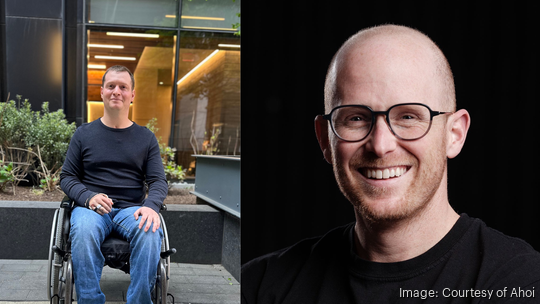
Jacob Haendel can list a string of bad experiences trying to navigate Boston streets and restaurants in a wheelchair. The former chef has used a wheelchair or scooter to get around the city after making a remarkable recovery from toxic acute progressive leukoencephalopathy. The brain condition put him in what doctors assumed was a vegetative state for months. In reality, Haendel was physically paralyzed, but aware of everything going on around him.
Eventually, the Massachusetts native began to recover. But that recovery came with new experiences and challenges navigating the world.
There was the time when shortly after getting out of the hospital, a care attendant was helping push him down a Boston sidewalk. When they reached the end, there was no curb cut sloping down to the ground. Another time, a group of friends invited him to dine in the North End, only to find when he arrived that there were steps leading into the restaurant.
“Those are some of the many experiences,” Haendel said. “I could go on all day.”
One day in September 2021, Haendel was dining with a few friends, including Justin Robinson, co-founder of Drizly, at a restaurant around North Station when he found himself stuck inside a bathroom stall and unable to unlock the door. His fine motor skills hadn't fully recovered, and his friends had to come and help him open the door.
Robinson said the experience helped him realize that even when a venue says it is “accessible,” that might not mean the same thing to everyone.
“It is accessible in the sense that you can wheel there. But the ramp is, like, up the back, it’s not a direct route, the door is super-heavy, and then when Jake got in, the lock was such that it was so small on the accessible bathroom, that you needed to have pretty fine motor skills to open and close the lock, which I didn’t appreciate” Robinson said.
Haendel regularly encounters situations where venues claim to be accessible, but the entrance, seating, bathroom or other areas might not meet everyone’s needs.
After the experience in this restaurant bathroom, Robinson realized they couldn’t wait for a company like Google to create an accessibility database. So, they did it themselves.
Haendel and Robinson recently launched Ahoi, a startup that has developed an app designed to help people with disabilities find accessible places and services. The app is available on iOS and Android devices. Users create a profile based on their needs, such as whether they need grab bars in the restroom or accessible parking, and search for restaurants, shops and other venues that meet those needs.
The app also allows viewers to leave reviews and more detailed information about the accessibility of venues.
“Accessibility is such a broad term, and everyone’s barriers are different. Everyone’s needs are different. So to kind of make something that (whether) you’re new to Boston or you even have lived in Boston in a chair or walker or cane, new to it, old to it — finding a group of places that work for you,” Haendel said.
Haendel and 50 beta users have reviewed over 1,000 places thus far. Since launching, Robinson said the app already has several hundred more reviews.
Even after living in Boston for years, Haendel says this project taught him about new restaurants that are accessible to him, including nine places in the North End — a notoriously difficult-to-navigate neighborhood.
For now, the focus is on building out reviews in the Boston area, and perfecting the functionality of the app.
Some of the longer-term projects include getting more granular details on rooms in buildings like hotels and restaurants and adding a wayfinding feature.
“If we look out 10 years, the high-level objective is to try to be a super app for this community of folks that often goes unserved, especially in the world of software,” Robinson said.
Sign up for The Beat, BostInno’s free daily innovation newsletter from BostInno reporter Hannah Green. See past examples here.








